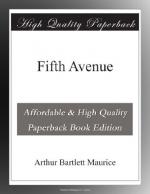Just eleven months to a day before the last entry, under date of May 30, 1850, Hone commented on the swiftly changing aspect of the city. To him the renovation of Broadway seemed to be an annual occurrence. If the houses were not pulled down they fell of their own accord. He wrote: “The large, three-story house, corner of Broadway and Fourth Street, occupied for several years by Mrs. Seton as a boarding-house, fell today at two o’clock, with a crash so astounding that the girls, with whom I was sitting in the library, imagined for a moment that it was caused by an earthquake. Fortunately the workmen had notice to make their escape. No lives were lost and no personal injury was sustained.
“The mania for converting Broadway into a street of shops is greater than ever. There is scarcely a block in the whole extent of this fine street of which some part is not in a state of transmutation. The City Hotel has given place to a row of splendid stores.
“Stewart is extending his stores to take in the whole front from Chambers to Reade Street; this is already the most magnificent dry-goods establishment in the world. I certainly do not remember anything to equal it in London or Paris; with the addition now in progress this edifice will be one of the ‘wonders’ of the Western world. Three or four good brick houses on the corner of Broadway and Spring Street have been levelled, I know not for what purpose—shops, no doubt. The houses—fine, costly edifices, opposite to me extending from Driggs’s corner down to a point opposite to Bond Street—are to make way for a grand concert and exhibition establishment.”
It is far from being all mellowness and amiability, that Diary. Hone had his prejudices and dislikes and strong political opinions. In the portraits that have been preserved there is the suggestion of intolerance and smug self-satisfaction. Also life did not turn out quite so rosy as it promised in 1828, when he retired from business with a handsome competence. In 1836, during the commercial depression, he met with financial reverses which forced him to return to the game of money-getting. He became president of the American Mutual Insurance Company, which was ruined by the great fire of July 19, 1845.
“A fire has occurred,” he recorded in the entry of that date, “the loss of which is probably $5,000,000; several of the insurance companies are ruined, and all are crippled. My office, I fear, is in the former category. We have lost between three and four hundred thousand dollars, which is more than we can pay.
“This is a hard stroke for me. I was pleasantly situated with a moderate support for my declining years, and now, ‘Othello’s occupation’s gone.’”
But he met his reverses in a courageous manner, and in 1849 President Taylor appointed him Naval Officer of the Port of New York, a place which he held until his death.




